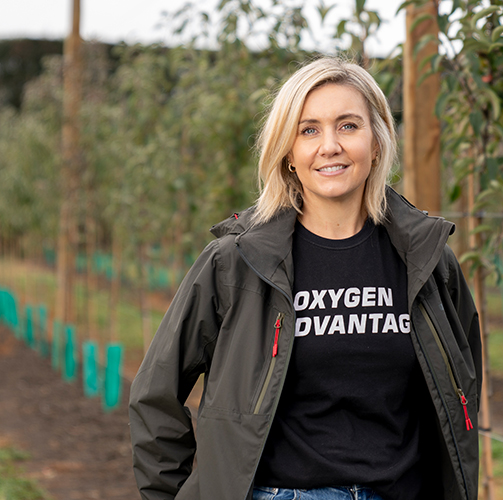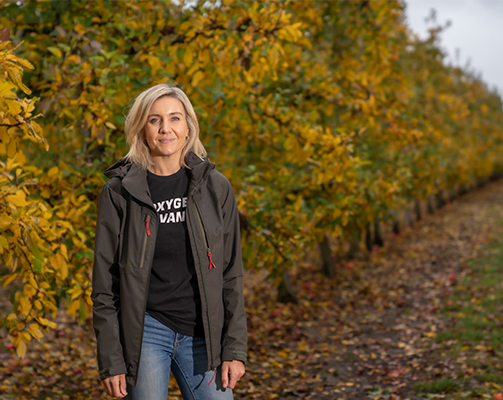

How Farmers can Harness the Power of Breath
The challenges of rural life are well documented, and we’re reminded of our industry’s struggles in almost every rural publication we flick through. We spoke to Hawke’s Bay orchard owner, wellness coach and mother of two, Gemma Douglas, about using breath to help deal with adversity, and her mission to support rural mums.
High interest rates, low commodity prices, inflationary pressures, staffing woes, compliance requirements, government regulations, adverse weather events… the list of challenges facing Kiwi farmers and growers is long and overwhelming and often complicated. But Gemma Douglas reckons they don’t need to steal our happiness and rob us of the joy there is in the world. It all comes back to the breath, she says.
An asthmatic who has required an inhaler throughout her whole life, Gemma began learning about the art of breathwork while on a personal wellness journey that began after she left her city life behind to live on her husband Andrew’s family orchard. “I realised with my own training, I could relieve my asthma symptoms and no longer rely on an inhaler like I used to. It was life changing.”
Diving deep into the Wim Hof method of mindset training, cold water immersion and breathwork, Gemma became so passionate about the incredible results she discovered within herself, that she wanted to share the skills with others. In May last year she attended a week long Wim Hof instructor course in Spain.
Being only one of five qualified instructors in New Zealand, she now conducts online group sessions and one-on-one coaching, and facilitates retreats with other wellbeing professionals. The lessons can be valuable for those in the rural sector dealing with stressful situations, and Gemma has some simple tips that can be applied while sitting on a tractor.
Unleashing a Superpower
“Using the power of our breath is like a superpower,” she says. “When we are aware of our breath, we are aware of the present moment, taking us out of our heads - from the anxiety and worry of the past or future. Breath counting is really simple but incredibly powerful.” Gemma advises people to put a timer on for two minutes. “Inhale for four seconds, hold for two and exhale for eight. You're using your breath like a remote control to your nervous system – telling it that you are safe and putting you in a rest and digest state.”
Once we settle the nervous system and teach our body and mind we are safe, Gemma says we can then move to strengthening the body with hormetic stress. “It’s positive stress instead of distress. Both breathwork and cold therapy can be examples of this.”
Gemma explains hormetic stress is when we expose our body to short term stressors. “It allows our body to build up a defence system or reawakens the defence system – often weakened by modern lifestyles.” Temperature control, sedentary lifestyle, environmental toxins paired with nutritional habits can weaken our defence system, she says.
Finding comfort within discomfort can be incredibly empowering, she said. “When we purposely expose our body to small amounts of fight and flight, such as cold water, while simultaneously using our breath to switch on our rest and digest we increase our stress resilience and raise our threshold so we can handle higher levels of stress in other parts of our lives and helps us bounce back quickly. It also increases those feel-good chemicals of dopamine and endorphins as well as the focus and energy hormones of adrenaline and noradrenaline.”


Digging Deep in the Face of Adversity
These lessons would have come in handy when Cyclone Gabrielle struck last year. Gemma and Andrew own and lease 38ha of apple orchards spread out across four locations in Twyford near Hastings. Two hectares of their top-end premium export apple trees were completely decimated; all of the trellised rows snapped at the base of the trunk and a further 8ha swallowed by floodwaters and silt.
Overall, the couple lost about 30 percent of last year’s income. “The silver lining was that there was still fruit that was salvageable. We couldn’t pick anything that had been submerged in water, but we could pick 30cm above that and the exporters wanted it.”
As it turned out, their house narrowly avoided being flooded by mere centimetres. “We can’t believe our house missed the deluge when friends just down the road had it a whole lot worse. Five minutes in either direction, it was a very different story. It was quite an unsettling feeling of guilt, knowing how lucky we had been, compared to so many others,” she said.
Fortunately fears the trees may not survive have been unfounded and this year’s harvest has been a bumper crop. “Andrew is the hardest working person I know; I wouldn’t be in this fortunate position to do the work I love without him and his commitment and dedication to the orchard,” she said.
“If there’s one thing that came from Cyclone Gabrielle, it is how we have come together both as a family and as a community; resilience truly is a virtue.”
Leaning Into Motherhood
Resilience was required when Gemma moved to her husband’s family orchard on the outskirts of Hastings in 2012 with a five-month-old and another on the way. Hailing from the deep South, Gemma’s father was a high school principal and her mother a nurse.
While she was used to her father working long hours when she was young, he was still able to clock off at the weekends and school holidays and take time out for family. But during peak busy times in any rural business, this isn’t the case, and Gemma can recall feeling intensely lonely as Andrew worked dawn ‘til dusk in the orchard.
“As a new mum with this little baby, I feel like I became almost socially inept. Apart from my family, I knew absolutely no one. I lost a lot of my confidence, and I had massive identity shift. I had left my corporate job in Auckland which I loved, and I was good at, and now where was I?”
Living around 15 minutes from the nearest shop, Gemma says their rural life is nowhere as remote as some. “I guess it’s all relative to what we become use to. Popping into the supermarket on a daily basis, seeing a movie or going to the gym; all those things you don’t even think twice about choosing to do when you live in a city all of a sudden become part of a priority list that get bumped down depending on their importance and whether a trip to town can be justified.”
Orchard life was challenging for the first few years and Gemma learnt a whole new set of practical skills. “I had a new baby, but I managed to get out there. My father-in-law Max embraced my presence on the orchard, and I learnt to drive the tractors and hydroladders during the busy harvest months. My mother-in-law Sharon had done this for more than 40 years, so I had some pretty big shoes to fill.”
In 2018 Gemma started an online community she called The Motherhood Project, and she found herself again through her online connection with other mums. “It can be hard to get out the door when you have little ones, so this was somewhere that offered that connection we all craved. Just knowing you’re not alone in the motherhood journey is so powerful,” she said.
“Selfcare has always been a theme that has run through The Motherhood Project; it’s not about saying ‘me first, or me last, but me too’. “We can’t look after others if we aren’t looking after ourselves and as mothers, we set the energy for the day within the nucleus of our family.”
Initially the Facebook and Instagram pages were a platform where she shared content and insights from different mothers and experts but over time as her confidence grew, she started sharing more of her own reflections and found many of her posts resonated with her followers. “I knew if a post I was drafting was making me cry, then it was likely going to strike a chord with its readers as well.”
Across Instagram and Facebook The Motherhood Project now has more than 235,000 followers. Unlike other content creators with a large following, Gemma has opted not to use this following to monetise her content. “There is the odd giveaway, but it has just been about offering a community to these mothers and helping them feel connected when they are deep in the throes of becoming a new parent.”
Gemma credits the strong, independent, and confident voice she has found within herself to her parents. “Growing up, Mum and Dad encouraged my brother, two sisters and I to speak up. Dad supported us to give absolutely everything a go and Mum is a very empathetic woman with a strong awareness of others and herself.”
Society is beginning to change, Gemma believes. The patriarchal messages that were once accepted as the norm are now questioned and dismissed by a new generation. “Hardship has always been there, and I choose not to believe the dialogue when people say, ‘oh my grandmother did it with five children and no power and she didn’t struggle’. Well, I call B.S on that, I would say she did struggle and probably had some really dark moments, she just didn’t have the platform like we do now.”
Three handy breathing techniques to bring back the calm:
- Deep, Nose and Slow: Three words to remember for functional breathing. Work on bringing your breath deeper into the belly. When you inhale your belly should expand, when you exhale your belly should deflate. This is caused by engaging your diaphragm in the correct way. Try to switch to full nasal breathing. I tell my kids, nose is for breathing, mouth is for eating.
- 12 second breath: Inhale for four, hold for two and exhale for six. (Put a timer on for two to five minutes). This will switch on your rest and digest. A great one to do in stressful moments or before bed.
- Cadence Breathing: Breathing at a rate of six breaths per minute (in for four seconds, out for six seconds). This may be hard to begin with if you're not diaphragmatic breathing but will get easier. This breathing also switches on your parasympathetic (rest and digest part of your nervous system.) The vagus nerve is stimulated to lower the speed of your heart rate and then dilates the blood vessels. This improves blood pressure and lowers stress and anxiety. Start with five minutes, work your way up to 10 mins.
Gemma undertakes a number of retreats, group workshops and one on one sessions. Learn more about Gemma at gemmadouglas.co.nz
Please note, if you are pregnant, have epilepsy, heart conditions, or have recently undergone surgery, it is advisable to consult with a healthcare professional before using cold immersion therapy, as participation is not advisable.

